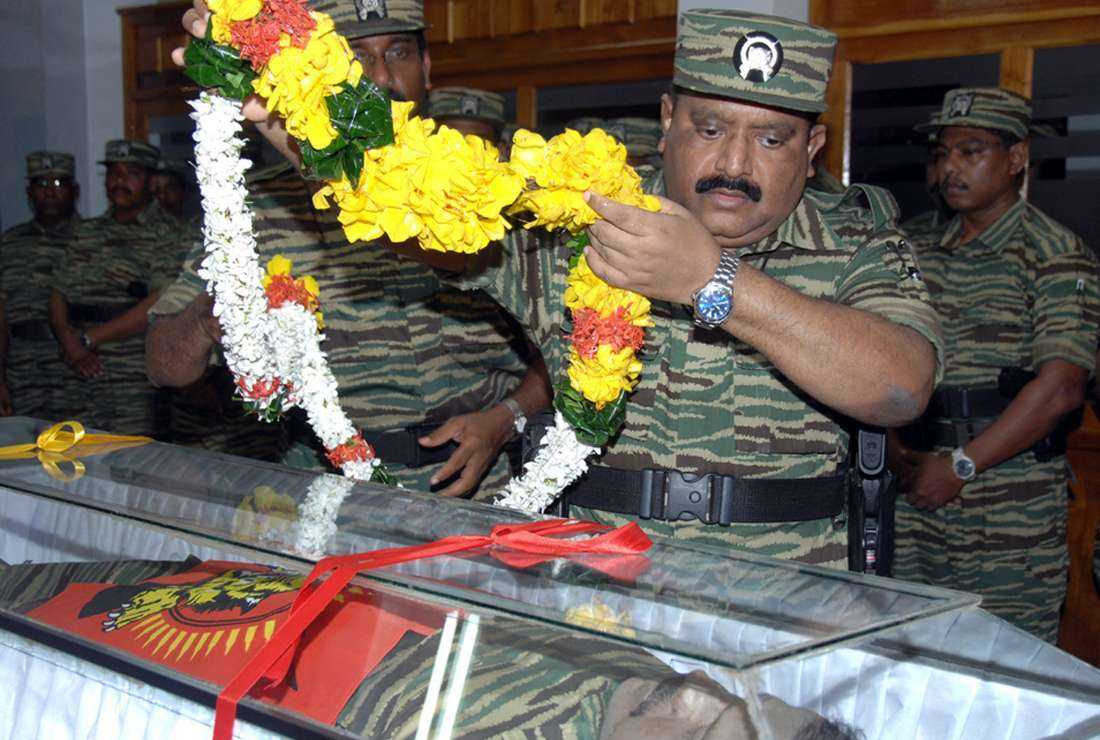The commemoration of ‘Maveerar Naal’ or Martyrs’ Day on Nov. 27 continues to be a bone of contention in the island nation

Velupillai Prabakaran, leader of the Liberation Tigers of Tamil Eelam, laying a floral tribute on the body of his senior military commander in northern Sri Lanka on May 21, 2008. Prabakaran was gunned by the Sri Lankan military on May 18, 2009. Honoring the fallen heroes has been a practice started by the armed rebel group. (Photo: AFP)
Every year, Benedict Maduththeen, a fisherman in northern Jaffna, marks the Martyrs’ Day on Nov. 27 in honor of his relatives and friends who perished in the Sri Lankan civil war.
“How can I forget them? As long as I am alive, I will continue to remember them. It is my right,” Maduththeen, 72, told UCA News despite the conditional ban by the government on observing the day (Maveerar Naal).
The remembrance by the Tamil minority of those who died or disappeared during the bloody civil war, which lasted 26 years, remains a bone of contention in the island nation.
Fourteen years after the civil war ended, the Tamil minority alleges their sentiments, rights and grievances were never respected and addressed by the victorious government comprising the Sinhala majority.
They allege the government has destroyed the cemeteries of their heroes and demolished all public monuments depicting their struggle.
The government has set up military camps on what were earlier cemeteries of martyrs, they add.
On Nov. 27, thousands of Tamil people in the Northern and Eastern provinces, which were once strongholds of armed rebel groups, gathered in front of the designated war cemeteries which were partially or completely demolished by security forces after the war came to an end in 2009.
This year, 12 people, including a school-going student, were detained under the sweeping Prevention of Terrorism Act (PTA) for organizing commemorative events in the Buddhist-majority nation.
Newton Danusan, a student at Vantharumoolai Madhya Maha Vidyalayam in Batticaloa in the Eastern province, along with his father was among those arrested after police disrupted the commemorative event.
Danusan, 18, was rounded up while helping his father with the power supply to organize the event.
A 22-year-old youth was arrested in Jaffna for wearing a T-shirt showcasing Velupillai Prabhakaran, the slain leader of the Liberation Tigers of Tamil Eelam (LTTE), which was defeated in May 2009 by government forces amidst allegations of human rights violations and war crimes.
During the budget session of parliament on Dec. 2, parliamentarian M.A. Sumanthiran from Jaffna alleged that laws and regulations were selectively applied based on people’s ethnicity and race.
The lawmaker was referring to the arrests under the PTA and attempts by police to disrupt the commemorative events.
Sumanthiran told parliament that in the capital Colombo, commemorative events to remember Rohana Wijeweera — a former leader of the People’s Liberation Front who tried to overthrow the government in the 1980s — are allowed.
“But in the north and the east, where the Tamil community lives, people are prevented from remembering their loved ones,” he alleged.
Why is the law selectively implemented in this country, the parliamentarian asked and said the country’s judiciary was also intimidated by the government.
Rights activists point out that the sweeping PTA was enacted as a temporary measure in 1979 to eradicate the insurrection of the People’s Liberation Front. However, the law was used to target Tamil separatists.
Under the law, the authorities can detain a suspect for up to one year without trial, they added.
Sumanthiran was a party to seven cases filed by police in Kilinochchi, the erstwhile capital of the LTTE in Northern province, to ban commemorative events.
However, the courts allowed them on condition that no images related to the LTTE be showcased.
According to Sumanthiran, holding collective commemorative events is a fundamental right of citizens guaranteed by the nation’s constitution.
The use of the draconian PTA was flayed by the United Nations Office of the High Commissioner for Human Rights (OCHR) and the diplomatic community in the country.
“We are concerned at the recent arrests in Northern and Eastern Provinces under the Prevention of Terrorism Act, which runs counter to the government’s promised moratorium on the use of the law that violates human rights obligations,” the OCHR said on X, formerly Twitter.
A European Union delegation to Sri Lanka also aired similar concerns, and stressed that “authorities should bring the legislation in line with international standards.”
Responding to the allegations, Minister of Justice Wijeyadasa Rajapakshe said the latest arrests were made for violation of court orders and glorifying activities of the LTTE.
The observation of Maveerar Naal illustrates the enduring intimacy between the armed struggle and the political aspirations of the minority Tamil people in Sri Lanka.
After all, it is not a private memorial by family members of the dead, but a collective reclamation of the Tamil liberation movement in the South Asian nation, say observers.

